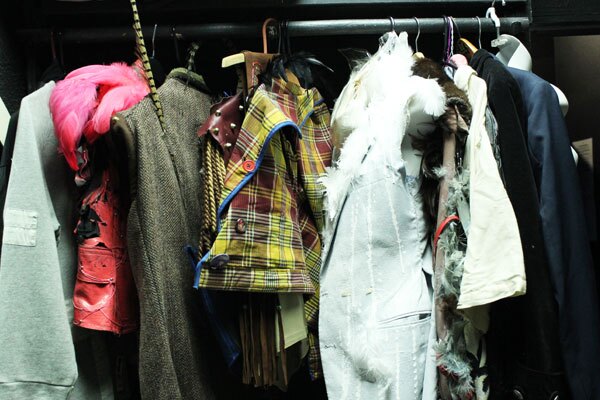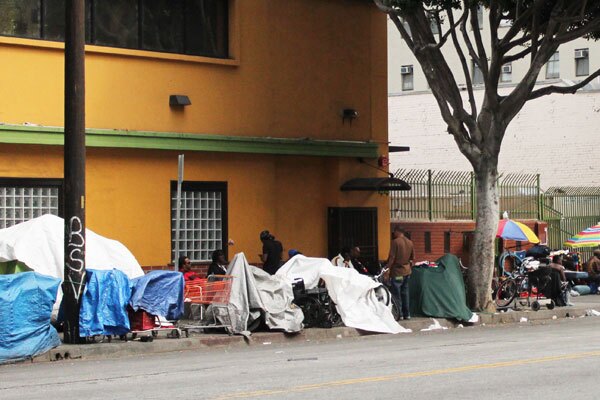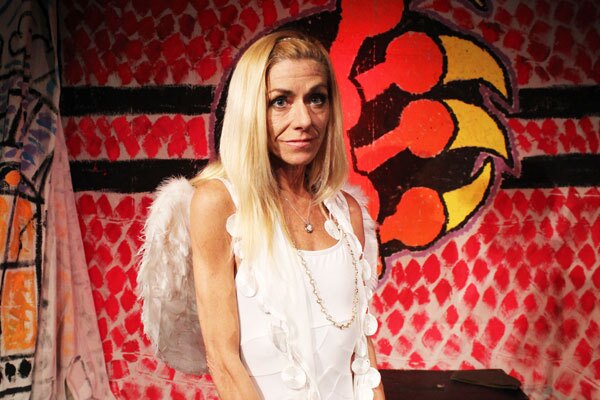The Strindberg Laboratory: Skid Row Actors Reshape L.A. through Theater

Who gets to fly in L.A. and who is destined to live forever on the ground, without any opportunities to rise up? Since its establishment in 2012, the delightfully unorthodox L.A. theater company Strindberg Laboratory, which casts unprofessional actors mostly from Skid Row's missions and recovery programs, has been seeking a new answer to this question.
Strindberg's adaptation of "The Birds", a comedy by the ancient Greek playwright Aristophanes, opened in June at Sidewalk Studio Theatre in Burbank. First performed in 414 B.C., the original rendering of "The Birds" follows Pistheteareus, a middle-aged Athenian man who convinces the world's birds to build him a city in the sky so that he can control communications between man and the gods. In Aristophanes' version, Pistheteareus is magically transformed into a bird himself, eventually superseding Zeus as the greatest being in the universe.

In Strindberg Laboratory's version, Dick Cheney and the Koch brothers replace Zeus as the modern world's most privileged and powerful overlords. Indeed, all of the bird characters in Strindberg's production are contemporary too, including a Bird King clad in neon pink spandex and a rapping Felonious Falcon. True to the original, Strindberg's birds still face the same struggle as their Athenian predecessors: they seek to build their own kingdom in the sky, one where they might finally escape the injustices of the human world and preside over their own fate.
This plot point takes on particularly special meaning among Strindberg's actors, many of whom have experienced incarceration, homelessness, and addiction in and around L.A.'s infamous Skid Row. Directors Michael Bierman and Meri Pakarinen initially founded Strindberg Laboratory three years ago as a way to teach acting workshops to inmates in the L.A. County jail system, but later expanded their program after recognizing the scarcity of outside support available for ex-offenders. Most of the actors cast in "The Birds" first became involved with Strindberg through Bierman and Pakarinen's outreach work at the Volunteers of America Los Angeles and Union Rescue Mission; others stayed in contact with Bierman and Pakarinen after being released from jail. In 2015, Bierman and Pakarinen also established Strindberg's "Jails/Prisons to Jobs" program, which helps place Strindberg's actors in paid positions teaching drama and improv classes to various communities in need around L.A. County.

"We're trying to create a space where people can be creative, get hired, and display the potential and promise of a class that's underserved," said Bierman on opening night of "The Birds" last month. "The whole idea is starting new. When you've served your time, you've served your time. That's it. The big problem with society and the reason why we're creating this jobs program is that society still judges this population when they get out, so for us it's important that they get a fresh start."
In reality, what the actors of Strindberg Laboratory know all too well is that, as members of some of the city's most marginalized populations, they are not the ones chosen to inhabit downtown L.A.'s newly idealized "city in the sky," where converted luxury lofts and rooftop hotel pools are quickly becoming the norm. Rather, they are actively kept out of it.
Marshall May, a recovered crack addict who plays the Bird King in "The Birds," has been struggling to find regular employment since he was released from Men's Central Jail almost a year ago. "I've been trying honestly to get a job and I can't get a job," said Marshall. "People look at you. They look at your application and they go to the questions: 'Have you ever been to jail?,' 'Are you a convicted felon?,' 'Have you committed a crime in the past seven years?' The expression on some of their faces is just so heart wrenching because I've already done the time. I've paid my debt to society by being in prison. So now it's double jeopardy, and it's a very discouraging process."

May is the first participant in Strindberg's Jails/Prisons to Jobs program. Since June 2015, May has been leading acting workshops for autistic teens through F.A.C.T. Family's services at the Westwood Village Synagogue, where he commutes from his childhood home in Baldwin Hills.
"We're talking about people from Westwood being taught by a person who has lived on Skid Row and has been in the jail system," Bierman explained. "It's about the reintegration of communities."
But how possible is Strindberg's ideal in L.A., a city whose identity has long been rooted in its multitude of separate -- and certainly not economically equal -- neighborhoods? It's been twenty-five years since Mike Davis published his landmark text "City of Quartz," which examines the privatized powers and gated-community urbanism that created L.A. over the course of the 20th century. Davis calls the result "spatial apartheid," referencing in particular the redesign of downtown's Bunker Hill, which was constructed like a protected citadel above the surrounding city blight.

An even more recent example is real estate mogul Geoffrey Palmer's Da Vinci apartment complex, a massive faux-Italian renaissance building constructed at the interchange of the 101 and 110 freeways. Believing L.A.'s homeless population posed a safety threat to future renters, Palmer's plan for the high-end, 526-unit building included a controversial pedestrian bridge that would connect the Da Vinci to other buildings in the area, allowing renters to avoid interaction with downtown street life. In December 2014 the Da Vinci was mysteriously engulfed in flames during the middle of the night: it is suspected that an arsonist attempted to burn the building (and its bridge) to the ground.
While L.A. has undoubtedly experienced change from the time Davis was writing in 1990, Skid Row has struggled to transform since many of the county's social service organizations made the fateful decision to centralize in the area between Alameda Street and Main Street. The same goes for those who are living and seeking services in Skid Row: what may have once appeared like a temporary solution is now revealing itself to be a more permanent sentence. Theodore Parker, who is currently enrolled in one of Union Rescue Mission's live-in programs and who joined the cast of "The Birds" as a form of reprieve, laments, "I never found myself wanting to be downtown. I don't like that environment, so every chance I get I try to leave that environment because it can wear on you...People have the misconception that everybody in the missions is used to that lifestyle, but a lot of us aren't. I was raised in Altadena. It ain't nothing like Skid Row."
Additionally, Carrie Gazzaruso, who acts as a flamingo and a dove in the play and who first became involved with Strindberg through a drug rehab program at the Volunteers of America, said, "I never even knew [Burbank] existed!" Meanwhile, Marshall May dreams of someday leaving his mother's home in Baldwin Hills for West Hollywood, particularly that stretch of Sunset Boulevard near the Beverly Hills Hotel, where May describes the houses as "just stunning."

The big idea behind Strindberg Laboratory is reintegration. Bierman and Pakarinen are not only seeking to help transition their actors back into society, but they are also making strides to transcend prejudices and reintegrate L.A. communities that have long been purposefully disconnected from each other. Whether or not their audience realized it, on opening night of "The Birds" last month the 35-seat playhouse Sidewalk Studio Theatre held residents of Burbank, Hollywood, Los Feliz, Long Beach, San Pedro, and Skid Row, with even more audience members taking up space on the floor after the seats had filled.
"We're continuing to make sure that whenever we do a play with people from Skid Row, or people from the prison and jail system, they're seen by people who generally don't associate with people like that," Bierman explained.
For this reason, Bierman and Pakarinen will bring "The Birds" to a variety of L.A. neighborhoods this summer, including performances at downtown L.A.'s The Vortex later this month and a theater in Long Beach in August. They are also continuing to seek funding to expand their Jails to Jobs program, which is currently being self-financed by Bierman and Pakarinen.

Still, the question that looms is whether Strindberg's vision of a new and just L.A. is only a fictitious one. Can over 100 years of city history really be thwarted in this way? For despite what is written into the play, at the end of "The Birds" I could not help but notice that the lights still go up, the audience returns to their respective corners of the city, and the birds' kingdom in the sky -- once glorious in its glittering, feathered promise -- is revealed as yet another empty L.A. theater.


